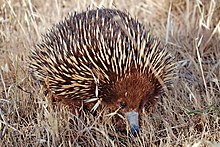What does Tachyglossus mean?
Definitions for Tachyglossus
tachy·glos·sus
This dictionary definitions page includes all the possible meanings, example usage and translations of the word Tachyglossus.
Princeton's WordNet
Tachyglossus, genus Tachyglossusnoun
type genus of the family Tachyglossidae
Wikipedia
Tachyglossus
The short-beaked echidna (Tachyglossus aculeatus), also called the short-nosed echidna, is one of four living species of echidna and the only member of the genus Tachyglossus. It is covered in fur and spines and has a distinctive snout and a specialized tongue, which it uses to catch its insect prey at a great speed. Like the other extant monotremes, the short-beaked echidna lays eggs; the monotremes are the only living group of mammals to do so. The short-beaked echidna has extremely strong front limbs and claws, which allow it to burrow quickly with great power. As it needs to be able to survive underground, it has a significant tolerance to high levels of carbon dioxide and low levels of oxygen. It has no weapons or fighting ability but repels predators by curling into a ball and deterring them with its spines. It lacks the ability to sweat and cannot deal with heat well, so it tends to avoid daytime activity in hot weather. It can swim if needed. The snout has mechanoreceptors and electroreceptors that help the echidna to detect its surroundings. During the Australian winter, it goes into deep torpor and hibernation, reducing its metabolism to save energy. As the temperature increases, it emerges to mate. Female echidnas lay one egg a year and the mating period is the only time the otherwise solitary animals meet one another; the male has no further contact with the female or his offspring after mating. A newborn echidna is the size of a grape but grows rapidly on its mother's milk, which is very rich in nutrients. Baby echidnas eventually grow too large and spiky to stay in the pouch and, around seven weeks after hatching, are expelled from the pouch into the mother's burrow. At around six months of age, they leave the burrow and have no more contact with their mothers. The species is found throughout Australia, where it is the most widespread native mammal, and in coastal and highland regions of eastern New Guinea, where it is known as the mungwe in the Daribi and Chimbu languages. It is not threatened with extinction, but human activities, such as hunting, habitat destruction, and the introduction of foreign predatory species and parasites, have reduced its distribution in Australia.
ChatGPT
tachyglossus
Tachyglossus is a genus of monotremes, more commonly known as the echidna or spiny anteater. This mammal is native to Australia and New Guinea and is known for its ability to lay eggs, its spiny coat, and long sticky tongue used for catching insects.
Matched Categories
Numerology
Chaldean Numerology
The numerical value of Tachyglossus in Chaldean Numerology is: 6
Pythagorean Numerology
The numerical value of Tachyglossus in Pythagorean Numerology is: 7
Translations for Tachyglossus
From our Multilingual Translation Dictionary
Get even more translations for Tachyglossus »
Translation
Find a translation for the Tachyglossus definition in other languages:
Select another language:
- - Select -
- 简体中文 (Chinese - Simplified)
- 繁體中文 (Chinese - Traditional)
- Español (Spanish)
- Esperanto (Esperanto)
- 日本語 (Japanese)
- Português (Portuguese)
- Deutsch (German)
- العربية (Arabic)
- Français (French)
- Русский (Russian)
- ಕನ್ನಡ (Kannada)
- 한국어 (Korean)
- עברית (Hebrew)
- Gaeilge (Irish)
- Українська (Ukrainian)
- اردو (Urdu)
- Magyar (Hungarian)
- मानक हिन्दी (Hindi)
- Indonesia (Indonesian)
- Italiano (Italian)
- தமிழ் (Tamil)
- Türkçe (Turkish)
- తెలుగు (Telugu)
- ภาษาไทย (Thai)
- Tiếng Việt (Vietnamese)
- Čeština (Czech)
- Polski (Polish)
- Bahasa Indonesia (Indonesian)
- Românește (Romanian)
- Nederlands (Dutch)
- Ελληνικά (Greek)
- Latinum (Latin)
- Svenska (Swedish)
- Dansk (Danish)
- Suomi (Finnish)
- فارسی (Persian)
- ייִדיש (Yiddish)
- հայերեն (Armenian)
- Norsk (Norwegian)
- English (English)
Word of the Day
Would you like us to send you a FREE new word definition delivered to your inbox daily?
Citation
Use the citation below to add this definition to your bibliography:
Style:MLAChicagoAPA
"Tachyglossus." Definitions.net. STANDS4 LLC, 2024. Web. 26 Apr. 2024. <https://www.definitions.net/definition/Tachyglossus>.



Discuss these Tachyglossus definitions with the community:
Report Comment
We're doing our best to make sure our content is useful, accurate and safe.
If by any chance you spot an inappropriate comment while navigating through our website please use this form to let us know, and we'll take care of it shortly.
Attachment
You need to be logged in to favorite.
Log In